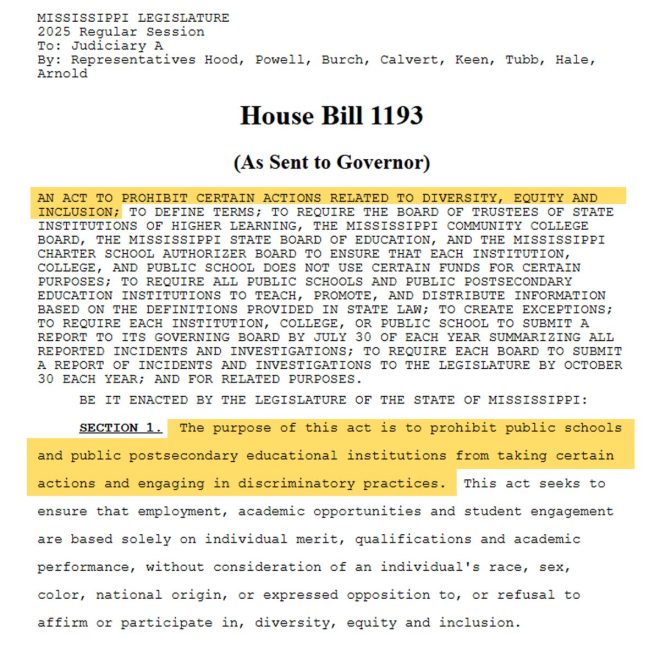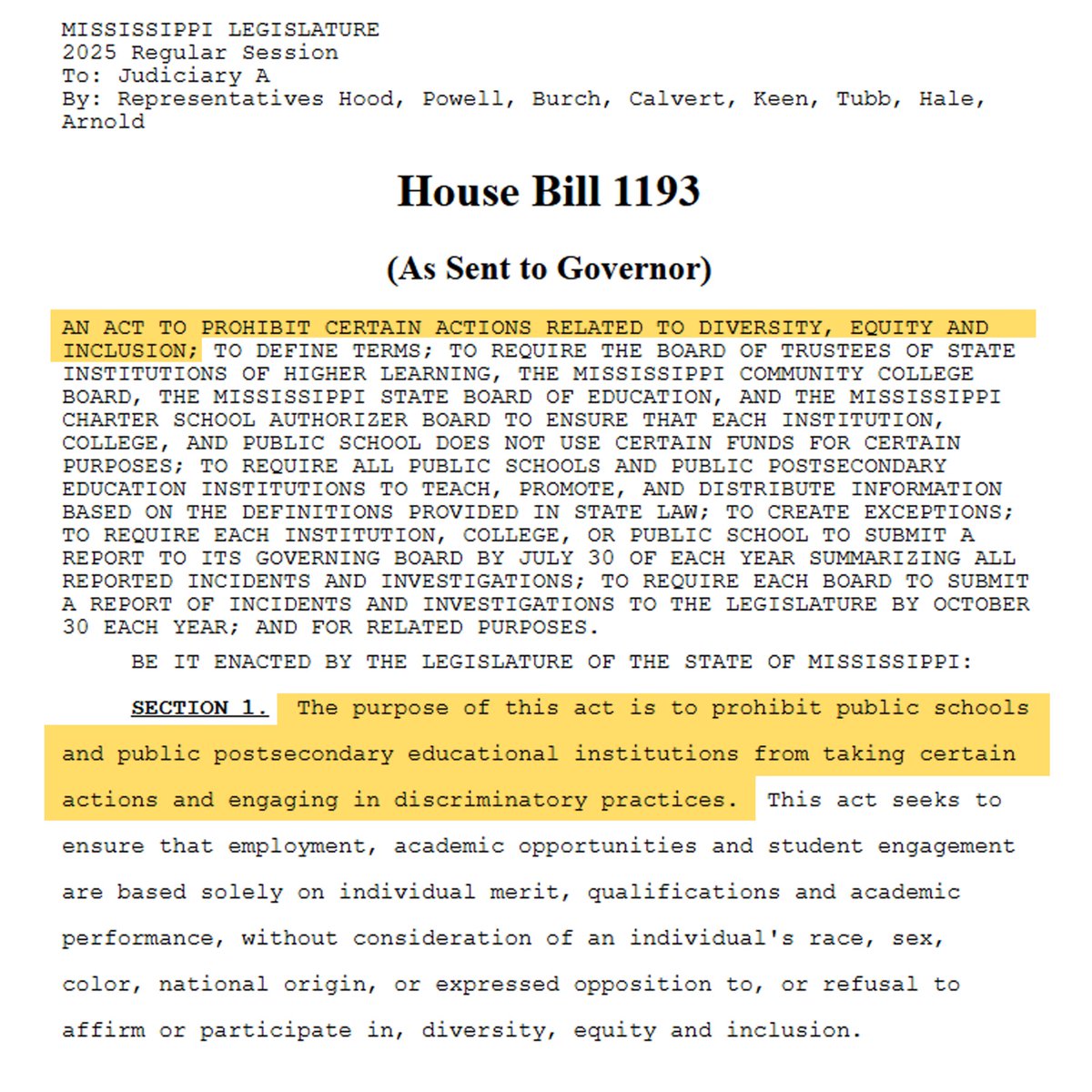
Mississippi Libraries Ordered to Remove Race and Gender Studies Material from MAGNOLIA Database
In a significant development for the state of Mississippi, libraries have been mandated to eliminate race and gender studies content from the state-funded MAGNOLIA database. This decision aligns with recent legislative actions aimed at curbing what some officials describe as "radical DEI initiatives" (Diversity, Equity, and Inclusion) in educational resources. This move is being hailed as a substantial victory for supporters of these legislative changes, asserting a commitment to a specific educational framework that aligns with the state’s values.
Background of the Decision
The MAGNOLIA (Mississippi Alliance for Gaining New Opportunities through Library Information Access) database is a vital resource for libraries across Mississippi, providing access to a wealth of academic and research materials. However, the recent order to remove specific content reflects a broader trend in the state, where officials seek to reshape the educational landscape by limiting access to materials they deem controversial or inconsistent with state laws.
This legislative shift is part of a nationwide movement where several states are reevaluating the inclusion of topics related to race and gender in educational materials. Proponents argue that such actions are necessary to foster a more unified educational environment, while critics express concern that it stifles academic freedom and limits students’ exposure to diverse perspectives.
Implications for Mississippi Libraries
The directive to remove race and gender studies content from the MAGNOLIA database raises important questions about the future of library resources and the role of educational institutions in promoting a diverse range of ideas. Libraries have traditionally been seen as bastions of knowledge and gateways to a multitude of perspectives, and this decision could significantly impact how information is accessed and disseminated in Mississippi.
- YOU MAY ALSO LIKE TO WATCH THIS TRENDING STORY ON YOUTUBE. Waverly Hills Hospital's Horror Story: The Most Haunted Room 502
Supporters of the change argue that it is essential for aligning educational resources with the values of the community. They believe that removing certain materials will help prevent the perceived indoctrination of students and promote a more cohesive understanding of social issues. Critics, on the other hand, warn that this approach may lead to a narrow interpretation of historical and contemporary issues, depriving students of the opportunity to engage with critical social topics.
Reactions to the Order
The announcement has elicited a range of responses from various stakeholders. Supporters of the legislation view it as a necessary corrective measure, emphasizing the importance of state control over educational content. They argue that the inclusion of race and gender studies materials can sometimes promote divisive narratives that do not reflect the values of the broader community.
Conversely, opponents of the order have raised concerns about censorship and the implications for academic integrity. Many educators and librarians argue that such restrictions could undermine the ability of students to critically engage with complex social issues. They contend that exposure to diverse ideas is essential for developing critical thinking skills and fostering an inclusive learning environment.
The Future of DEI Initiatives in Mississippi
The decision to remove race and gender studies content from the MAGNOLIA database is part of a larger trend in Mississippi and other states to reevaluate DEI initiatives. As educational policies continue to evolve, the future of such initiatives remains uncertain. Advocates for DEI argue that fostering an inclusive environment is critical for preparing students to navigate a diverse world, while opponents assert that these initiatives can lead to division and conflict.
As Mississippi navigates this complex landscape, the ongoing discourse surrounding race, gender, and educational content will likely remain a focal point of public debate. Legislative changes will continue to shape the resources available to students and educators, and the impact of these decisions will be felt for years to come.
Conclusion
The recent order to remove race and gender studies materials from the MAGNOLIA database represents a pivotal moment for libraries and educational institutions in Mississippi. As the state grapples with the implications of this decision, it will be essential to monitor how these changes affect access to information and the educational experience for students. The balance between ensuring alignment with community values and promoting a diverse range of ideas will be a critical challenge moving forward. As Mississippi continues to redefine its educational landscape, the conversations surrounding race, gender, and education will remain at the forefront of public discourse.
This decision marks a significant moment in the ongoing debate over educational content, DEI initiatives, and the role of libraries in shaping the future of knowledge and learning in Mississippi.

JUST IN: Mississippi Libraries have been ordered to scrub race & gender studies material from the state-funded MAGNOLIA database to comply with state laws ending radical DEI initiatives.
BIG WIN for Mississippi! https://t.co/hSG7a71rT2
JUST IN: Mississippi Libraries have been ordered to scrub race & gender studies material from the state-funded MAGNOLIA database to comply with state laws ending radical DEI initiatives.
In a recent development, Mississippi libraries have been instructed to remove race and gender studies materials from the MAGNOLIA database, which is funded by the state. This directive is part of a larger movement to comply with state laws aimed at curtailing what some view as radical Diversity, Equity, and Inclusion (DEI) initiatives. For many, this decision represents a significant shift in how educational resources are managed in the state.
BIG WIN for Mississippi!
This action has been celebrated by some as a “BIG WIN for Mississippi.” Supporters argue that the removal of these materials is a necessary step toward ensuring that educational content aligns with the values and beliefs of the local community. They believe that the focus should be on traditional educational resources rather than controversial topics that could polarize students and families.
The MAGNOLIA Database: An Overview
The MAGNOLIA database is a vital resource for libraries across Mississippi. It provides access to a wealth of academic materials, research articles, and educational resources. However, with the new changes, this database will undergo a significant transformation, leading to questions about what types of materials will remain accessible. Critics of the decision argue that this could limit access to important scholarly work that addresses race and gender issues, potentially stifling academic discourse.
Understanding the Context of DEI Initiatives
DEI initiatives have become a hot-button issue in recent years, particularly in educational settings. These initiatives aim to promote inclusivity and equity across various demographics. However, some critics contend that certain DEI programs may promote divisive ideologies rather than fostering understanding and collaboration. In Mississippi, this has led to legislative actions aimed at reevaluating and, in some cases, dismantling these initiatives. The recent decision regarding the MAGNOLIA database is a clear reflection of this trend.
What Does This Mean for Mississippi Education?
The order to scrub race and gender studies materials raises several questions about the future of education in Mississippi. Will students be deprived of critical perspectives on race and gender issues? What impact will this have on teachers and their ability to provide a well-rounded education? For many educators, the concern is that limiting access to diverse viewpoints can hinder students’ ability to engage with real-world issues critically.
Support and Opposition: A Divided Response
As with any significant educational policy change, there are voices on both sides of the debate. Proponents of the decision argue that it is a necessary move to protect children from what they consider politically charged content. They believe that education should focus on foundational subjects without delving into complex social issues that may be better suited for discussion at home or in community settings.
On the other hand, opponents assert that removing these materials from the MAGNOLIA database could lead to a more homogenized curriculum that lacks depth and diversity. They argue that understanding race and gender dynamics is crucial for developing informed citizens who can navigate a multicultural world. For many, this is not merely an academic issue but a moral one, emphasizing the importance of inclusive education.
Implications for Future Legislation
This directive is likely to set a precedent for future legislation concerning educational content in Mississippi. If the state government continues down this path, we might see more educational resources being scrutinized and modified to align with specific ideological frameworks. This could have a lasting impact on the educational landscape, affecting everything from curriculum development to resource allocation in libraries.
The Role of Community in Education
As these changes unfold, the role of the community becomes increasingly important. Parents, educators, and local leaders must engage in conversations about what they want for their schools and libraries. Community input can help shape a more balanced approach to education, one that reflects the diverse needs and perspectives of the population. While some may view the removal of race and gender studies as a win, others see it as a loss of valuable educational opportunities.
What’s Next for Mississippi Libraries?
Looking ahead, Mississippi libraries will need to navigate this new landscape carefully. They must balance compliance with state laws while also striving to provide comprehensive educational resources for their patrons. This may involve seeking out alternative materials that align with state standards without compromising the integrity of educational offerings.
Moreover, librarians will play a critical role in advocating for diverse viewpoints and ensuring that the library remains a space for open dialogue and learning. It is essential for libraries to demonstrate their commitment to providing a wide range of resources, even in the face of legislative pressure to limit access to certain materials.
Engaging Students in Critical Conversations
Despite the changes to the MAGNOLIA database, it is crucial for educators to find ways to engage students in conversations about race and gender issues. This might involve incorporating discussions into existing curricula, utilizing non-traditional resources, or fostering an environment where students feel safe expressing their thoughts and questions.
Encouraging critical thinking and dialogue can help students navigate complex issues, even if certain materials are no longer available through traditional channels. Teachers can draw on their creativity and resourcefulness to ensure that their students receive a well-rounded education, one that prepares them for the complexities of the real world.
The Importance of Advocacy in Education
As Mississippi moves forward with these educational shifts, advocacy will be more important than ever. Educators, parents, and community members must work together to voice their concerns and push for policies that prioritize comprehensive and inclusive educational resources. Engaging with local representatives and participating in school board meetings can empower community members to take an active role in shaping the future of education in Mississippi.
Conclusion: A New Chapter for Mississippi Libraries
This recent directive to scrub race and gender studies materials from the MAGNOLIA database marks a significant turning point in Mississippi’s approach to education. While some celebrate this move as a victory for traditional values, others express concern over the potential loss of critical perspectives in educational resources. As the situation evolves, it will be essential for all stakeholders to engage in open discussions about the future of education in Mississippi.
Ultimately, the path forward will require collaboration, understanding, and a commitment to ensuring that all students have access to a diverse range of educational materials. Only then can Mississippi libraries truly fulfill their mission of serving the community and fostering an informed and engaged citizenry.
